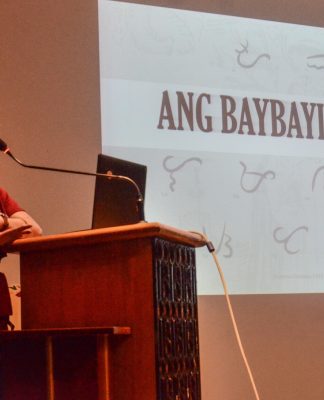ANYTHING in excess is bad.
With the uncontrollable influx of technological advancements, scientific and medical breakthroughs, humans are left to contemplate on which would be beneficial to mankind even if the advances detract from the social and religious norms.
When humans are monitored through microchips in their necks, foods are genetically engineered, and activities are governed by programmed data, man is no longer living but merely existing in a highly-sophisticated environment of artificial intelligence.
Nature of A.I.
A.I. is the simulation of human intelligence through a machine by identifying and using the right piece of knowledge in solving a problem. A.I. is so enormous in scope for it not only deals on robotics but also touches on a number of more established disciplines such as Philosophy, Psychology and Neuroscience.
Assistant Professor Jesus Agbayani of the UST College of Science Department of Information and Computer Studies (ICS) defines A.I. as “a field more concerned with the computational modeling as a methodology for explicating the interpretative processes which underlie intelligent behavior that relate sensing the environment to action in it.”
University undertakings
Although studies on A.I. were conducted by ICS graduating students, Agbayani said that the researches were simply Expert Systems not enough to cover A.I. projects.
One example was last year’s best thesis in the college, the “Speech Recognition System,” by a group of ICS students led by alumnus Eric Canonizado, which was exhibited in the National Science and Technology Week fair at the Philippine Trade and Training Center held the same year.
The system aims to adapt voice commands in household appliances. For example, a coffee maker equipped with this program may automatically brew coffee through human voice initiation.
Similarly, scientists from the University of Edinburgh in the United States considered “Intelligent Robotics,” “Knowledge Based Systems,” “Mathematical Reasoning,” and “Natural Language Processing” as principal components of their studies in A.I. since the early 1980s. Today, the continuous development and advancement in the field are being successfully applied through innovative hybrid architecture for the hierarchical control of reactive robot devices.
Half-human?
With all the hype on modern gadgets brought by A.I. comes a very timely movie about a boy who is certainly up to do almost anything. In spite of his extra-ordinary capabilities, he longs for something immaterial but is already considered unnatural in his time. The Steven Spielberg movie “A.I.” unravels man’s intense desire to be superior above all beings by creating a robot programmed to love. It revolves around the life of David (Haley Joel Osment, “The Sixth Sense”), who is physically human but is really an android, a machine. He embarks on a journey to discover where he truly belongs and uncovers a world where the thin line between robot and machine is terrifyingly vast.
Science fiction and drama combined, the movie links the serious side of man’s humanity and immortality with the external conflicts of a highly progressive world.
Love loading
Man’s quest for the improvement of life has reached an accelerated period. With technology advancing at an astronomical pace, the challenge lies in creating the perfect being. But man is inherently emotional and basically instinctive. Moving one step further to perfection is taking away emotions, which is the very core of life. No matter how far technology gets, robots can never be programmed to feel and think like humans.

















